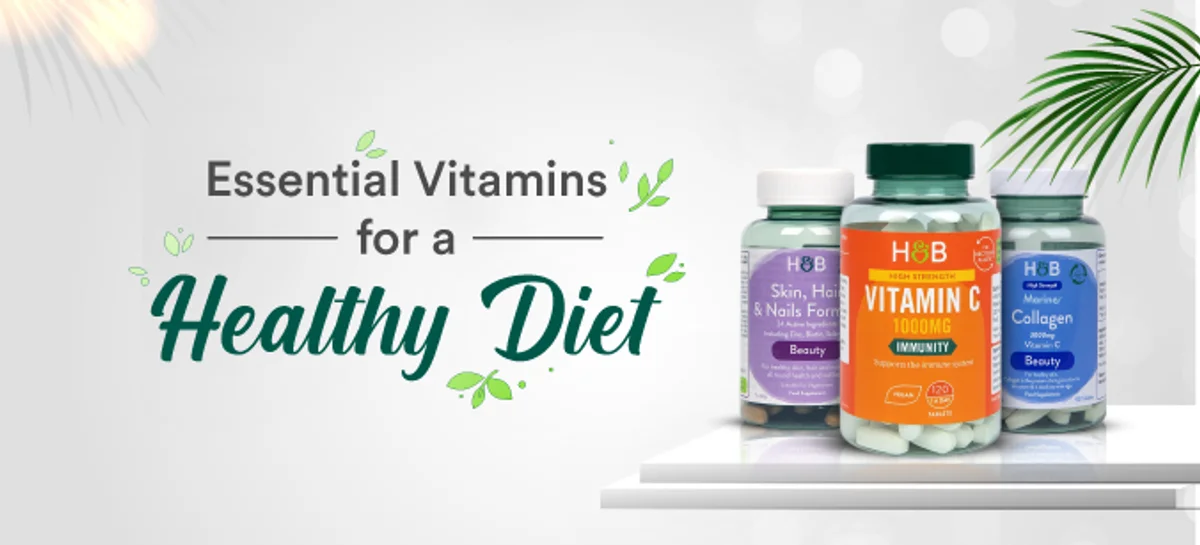- Home
- Blog
- Health & Nutrition
Understanding and Incorporating Essential Vitamins in Your Diet
Health & Nutrition
Understanding and Incorporating Essential Vitamins in Your Diet
By Apollo Pharmacy, Published on- 19 December 2023
Share this article
0
0 like

While most people may not be aware of it, there is a group of vitamins deemed ‘essential’ for the optimal functioning of the human body. Unfortunately, factors like lifestyle and suboptimal dietary choices can result in omitting these vital vitamins from one’s nutrition, leading to deficiencies and associated health risks. To ensure that your body is not deprived of these essential vitamins, it is imperative that you wholeheartedly add these vitamins to your daily diet.
Why Should You Take Vitamins?
Most individuals consume vitamin supplements to complement their dietary intake and promote their overall health. It's crucial to note that these are supplements, which means that they are there not to replace your balanced diet but to add in the missing micronutrients, essential for the optimal functioning of your body. A balanced diet should include a diverse range of fruits, vegetables, pulses, healthy fats, and whole grains.
Indications Your Body Needs Vitamin Supplementation
Your body communicates its needs, and it's essential to pay attention to signs indicating potential vitamin deficiencies. Right from hair fall and brittle nails to persistent weakness and fatigue, your body often provides enough cues for you to understand your overall health. Below mentioned are a few common signs and symptoms of vitamin deficiency.
Dull and Dry Hair, Nails & Skin
The following vitamins for dull and dry hair, nails, and skin are particularly beneficial for addressing these issues:
Vitamin A: Retinoids and carotenoids, which the liver converts into retinol, are two forms of vitamin A that help to maintain and promote the growth of healthier and more nourished skin.
Vitamin B: Well-known for promoting hair growth, vitamin B contributes to the maintenance of normal hair and skin. Riboflavin (vitamin B2), biotin (vitamin B7), folate (vitamin B9), and vitamin B12 are commonly recommended for addressing hair loss associated with deficiencies in these vitamins.
Vitamin C: Found abundantly in our skin, hair, and nails, this essential nutrient provides a structural basis for our health and is crucial for the production of collagen.
Selenium: As an antioxidant, selenium helps protect the body's cells from free radicals and oxidative stress, preventing weak, dull, and lifeless hair, skin, and nails.
Falling Sick More Often
A compromised immune system can manifest in various ways, and several vitamins play a key role in supporting immune function. Strengthen your body's natural defences with these key vitamins:
Vitamin C: It is known for its contribution to immunity and protection against oxidative stress.
Vitamin D: Recognised for supporting the immune system's normal function, a vitamin D deficiency can leave your body's defences weak.
Calcium: This important mineral aids immunity by acting as the initial trigger in our immune response to healing. If you notice that your skin is healing slowly, this could be an indication that you require more calcium.
Unexplained Fatigue & Weakness
If you find yourself experiencing unexplained tiredness, certain vitamins may provide the energy boost you need.
Iron: Weakness and fatigue are the first signs of iron deficiency. This micronutrient is essential for transporting oxygen to the cells of the body to reduce tiredness and fatigue. If you're vegan, vegetarian, pregnant, or menstruating, you may be at a higher risk of iron deficiency.
Vitamin B12: Lack of energy is one of the first signs of a vitamin B12 deficiency. While rare in healthy younger people, it's more common among older adults. Vegans should also consider a B12 supplement to support energy-yielding metabolism.
Struggle to Lose Weight
While taking vitamins alone does not necessarily guarantee weight loss, some supplements can support your efforts:
Vitamin D: Deficiency in vitamin D is associated with unwanted weight gain, making it a valuable addition to your weight loss journey.
Calcium: Crucial for healthy bones, calcium, taken with vitamin D, might help stabilise metabolism and control blood sugar, potentially leading to more weight loss during dieting.
In conclusion, understanding the role of essential vitamins and paying attention to your body's signals empowers you to make informed choices for your health. Keep in mind that for your general health, supplements should enhance your diet, not replace it.
Explore Essential Vitamin Supplements
Services
Health & Nutrition
Leave Comment
Services
Recommended for you

Health & Nutrition
How Melatonin Can Help You Fix Your Sleep Cycle: Everything You Need to Know
Having trouble sleeping? Melatonin might be the answer! A hormone that helps regulate your sleep cycle, melatonin can help you get to sleep and stay asleep.

Health & Nutrition
Fight the Winter Blues with Traditional Remedies
When you observe cricket on the hearth, early departure of geese and ducks, heavy winds with dry air, heavy fog in the mornings, hair fall, and skin rashes- understand that it's time to welcome winter. They say- dark mornings, darker evenings, and chilly grey days in between mean winter is here- and with the coldest season come the winter blues!

Health & Nutrition
Top 10 Multivitamin Tablets In India
Subscribe
Sign up for our free Health Library Daily Newsletter
Get doctor-approved health tips, news, and more.
